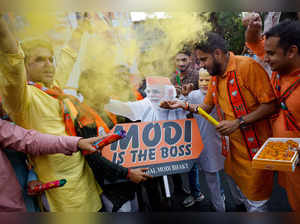 Reuters
ReutersSofia (Bulgaria): The world's largest general election having concluded with Prime Minister Narendra Modi-led NDA winning a third term, the second biggest electoral exercise got underway on Thursday as around 450 million European Union (EU) citizens began voting to choose 720 members of the European Parliament (MEPs) from 27 countries. In partnership with leading Bulgarian news agency BTA, PTI is in Sofia to capture the scale of these elections - one of the biggest democratic exercises in the world, second only to India as it signifies as many as 27 national elections. In Bulgaria, where voting will take place on Sunday, the elections have taken on an even greater significance as the country is simultaneously voting in its early National Assembly elections to elect 240 members of Parliament.
"A stable government in Bulgaria is the top priority, so that the country's membership of the Eurozone and the Schengen area can be speeded up," Dr Shteryo Nozharov, Economic Adviser to the Bulgarian Industrial Association, told PTI.
"This is the right way forward for the Bulgarian economy because it will vastly improve Bulgaria's credit rating, bring widespread economic efficiency and protect against extraneous shocks such as we saw with the COVID pandemic," he said.
Nozharov, a senior Bulgarian author and academic, believes this closer alignment with the EU is the central theme of these elections, which will eventually also bring Bulgaria closer to India through its membership of the 27-country economic bloc.
"India, after China, is a strongly developing global power and it is in Bulgaria's interest to build closer cooperation with one of the biggest markets of the world. A closer alignment with the Eurozone will lead to greater cooperation with India, on course to being one of the stars in the global economy in the next decade," he said.
India-Bulgaria annual bilateral trade is currently estimated at around USD 340 million and with the India-EU free trade agreement (FTA) negotiations ongoing, the economic expert is hopeful the divergences on technical barriers, environmental and health issues will be ironed out soon to also benefit Bulgaria as a member country.
While the European Parliament does not select a government, it has the power to approve or reject members of the European Commission - the powerful executive arm of the economic bloc.
Therefore, the make-up of the Parliament at the end of the elections on Sunday is being closely watched - not only in Europe but also beyond. The MEPs organise themselves into multinational political groupings, from the far left to the far right, and experts fear the winds of populism blowing across the continent will also impact the European Parliament outcome on Monday.
Meanwhile, Friday marks the end of the campaign period for Bulgaria, with Saturday earmarked as a day of introspection before voting day on Sunday. The country will elect 17 MEPs and the pro-Eurozone Citizens for European Development of Bulgaria (GERB) party is believed to be in the lead.
The country's national parliament elections will be the sixth time Bulgarians vote for their National Assembly since 2021, as snap elections were called in the wake of corruption scandals and Russian propaganda. Bulgaria has been one of Moscow's closest allies in the EU, with President Rumen Radev widely accused of being pro-Russian by his opponents. While condemning Russia for its invasion of Ukraine, he has also refused to provide aid to Kyiv.
The number of MEPs elected from each EU country is agreed before each election and is based on the principle of degressive proportionality, which means each MEP from a larger country represents more people than an MEP from a smaller country. The minimum number of MEPs from any country is six and the maximum number is 96.
European elections are held every five years, the last taking place in May 2019.
"A stable government in Bulgaria is the top priority, so that the country's membership of the Eurozone and the Schengen area can be speeded up," Dr Shteryo Nozharov, Economic Adviser to the Bulgarian Industrial Association, told PTI.
"This is the right way forward for the Bulgarian economy because it will vastly improve Bulgaria's credit rating, bring widespread economic efficiency and protect against extraneous shocks such as we saw with the COVID pandemic," he said.
Nozharov, a senior Bulgarian author and academic, believes this closer alignment with the EU is the central theme of these elections, which will eventually also bring Bulgaria closer to India through its membership of the 27-country economic bloc.
"India, after China, is a strongly developing global power and it is in Bulgaria's interest to build closer cooperation with one of the biggest markets of the world. A closer alignment with the Eurozone will lead to greater cooperation with India, on course to being one of the stars in the global economy in the next decade," he said.
India-Bulgaria annual bilateral trade is currently estimated at around USD 340 million and with the India-EU free trade agreement (FTA) negotiations ongoing, the economic expert is hopeful the divergences on technical barriers, environmental and health issues will be ironed out soon to also benefit Bulgaria as a member country.
While the European Parliament does not select a government, it has the power to approve or reject members of the European Commission - the powerful executive arm of the economic bloc.
Therefore, the make-up of the Parliament at the end of the elections on Sunday is being closely watched - not only in Europe but also beyond. The MEPs organise themselves into multinational political groupings, from the far left to the far right, and experts fear the winds of populism blowing across the continent will also impact the European Parliament outcome on Monday.
Meanwhile, Friday marks the end of the campaign period for Bulgaria, with Saturday earmarked as a day of introspection before voting day on Sunday. The country will elect 17 MEPs and the pro-Eurozone Citizens for European Development of Bulgaria (GERB) party is believed to be in the lead.
The country's national parliament elections will be the sixth time Bulgarians vote for their National Assembly since 2021, as snap elections were called in the wake of corruption scandals and Russian propaganda. Bulgaria has been one of Moscow's closest allies in the EU, with President Rumen Radev widely accused of being pro-Russian by his opponents. While condemning Russia for its invasion of Ukraine, he has also refused to provide aid to Kyiv.
The number of MEPs elected from each EU country is agreed before each election and is based on the principle of degressive proportionality, which means each MEP from a larger country represents more people than an MEP from a smaller country. The minimum number of MEPs from any country is six and the maximum number is 96.
European elections are held every five years, the last taking place in May 2019.
(Catch all the Business News, Breaking News, Budget 2024 Events and Latest News Updates on The Economic Times.)
Subscribe to The Economic Times Prime and read the ET ePaper online.
Read More News on
(Catch all the Business News, Breaking News, Budget 2024 Events and Latest News Updates on The Economic Times.)
Subscribe to The Economic Times Prime and read the ET ePaper online.





